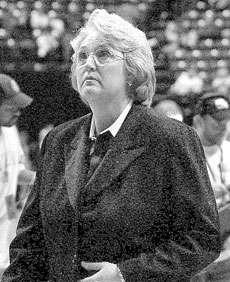Women have advantage in coach

Daily Illini File Photo
Nov 16, 2004
As another women’s basketball starts on Sunday, the Illini have one thing to their advantage – head coach Theresa Grentz.
Grentz is in her 31st year of coaching, her 10th at Illinois. She coached at St. Joseph’s and Rutgers, before joining the Illini in 1995. At Illinois, she has a record of 166-116, highlighted by a Big Ten championship in 1997, two Sweet Sixteen appearances and five NCAA Tournament berths.
As one of the pioneers of coaching in women’s basketball, she has one of the best reputations around the country.
“Illinois is always tough,” said Ohio State head coach Jim Foster. “Theresa knows what she’s doing over there and she is one of the best coaches in the country. Whenever you play her team, you know you are in for a fight. Last year was one of the few years that one of her teams did not make the (NCAA) tournament.”
When taking a look at the sidelines during an Illini game, it is evident that Grentz is an intense figure. Standing six feet tall, the former All-American at Immaculata College, can be heard instructing her team throughout Assembly Hall.
Get The Daily Illini in your inbox!
On Nov. 7 in an exhibition game against BK Poprad the Illini went into halftime up 52-39, but that did not stop Grentz from challenging her team in the locker room.
“I went into the locker room fired up,” Grentz said after the game. “I think I might have pulled a muscle in there when I was giving my speech. I just wanted them to come out and reach their goals. I wanted to fire them up.”
After halftime, the Illini responded, defeating the Slovakian team 114-74, setting a record for points scored by an Illini team.
“It all starts with coach,” said junior guard Janelle Hughes. “She always comes motivated. In turn, we have to come out and feed off that. We have to match her intensity. She’s like that all the time.”
Grentz, who is a person of faith, said when someone believes in something, they have to put their whole heart and soul into it.
“I believe in this team,” Grentz said. “My favorite part of coaching is coming to practice everyday to challenge them to work hard. I have to work hard and make sure I’m getting the best out of them.”
At Immaculata, she was a dominant force in the middle for the three-time national champions and was named player of the year in 1974.
When Grentz graduated, she wanted to pursue a research job in Biology or Chemistry, which was her major. Although she did not want to coach at first, Grentz is happy with her decision.
“Sometimes in life you make plans, but the good Lord tells you ‘You have to do the opposite.'” Grentz said. “I never planned on coaching.”
Grentz said her background in science has helped her coaching abilities.
“It taught me patience,” Grentz said. “It also taught me problem solving. It helped me see the big picture a lot better.”
In 1992, Grentz was asked to be head coach of the United States Olympic Women’s Basketball team in Barcelona, Spain. She led the Americans to a bronze medal.
“It was a great honor and a wonderful experience,” Grentz said. “I’ve spent a lot of time thinking about it. You can choose how you want to spend that moment, but you only get one shot and it’s gone.”
Grentz said it was after the 1992 Olympic Games she decided to come to Illinois.
“Things were different then,” she said. “Sports were changing. There was more corporate work involved. I knew I had to go somewhere I could take advantage of that. I also wanted to go somewhere to win. I felt like Illinois was that place.”
With a past like Grentz’s, many coaches would like to sit and reflect, but Grentz is more interested in the future.
“I have great faith, I leave the past in God’s mercy,” she said. “The future belongs to his practitioners. That is the task we talk about everyday in practice, we have the opportunity to live in the moment and do this. Somebody’s counting on us.”
Although Grentz brings a lot of intensity to the basketball court, she has committed herself to her players and the community.
“People see Theresa Grentz as a six-foot woman with a presence,” she said. “They’re afraid and don’t understand, so they are intimidated. If they would sit down, listen and chat, they would realize that I’m a caring individual with a lot of faith. My only concern when I leave, is ‘Have I done everything I could to help the student athletes that I have coached.”





